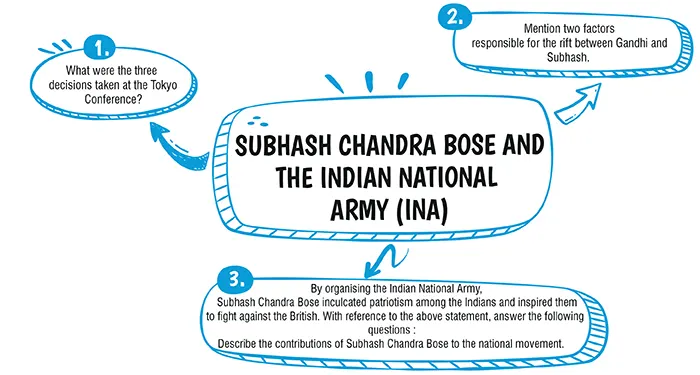Home / Board / ICSE / important Questions / Class 10 / History & Civics / Subhash Chandra Bose and the Indian National Army (INA)
Table of Contents

Ans. (b) Subhash Chandra Bose
Explanation:
Mahatma Gandhi was first called the "Father of the Nation" by Subhas Chandra Bose.
Ans. (d) Germany
Explanation:
Subhash Chandra Bose founded the Tiger Legion in Germany in 1941.
Explanation:
The Tokyo Conference was held from 28th March to 31st March 1942. It was attended by about more than 120 delegates from Burma, Malaya, Thailand, Indo-China, Japan, China etc. The Tokyo Conference passed a resolution to form an ‘Indian National Army’. At the Tokyo Conference (28th March, 1942), the following decisions were taken :
(i) To expand and strengthen the Indian Independence League.
(ii) To form under the overall command of the League an Indian National Army (INA) i.e., an army for the liberation of India; and
(iii) To hold a Conference at Bangkok to consolidate these decisions.
Explanation:
Bose and Gandhi possessed opposite views that led to irreconcilable differences between the two:
(a) Subhash believed in socialism and revolutionary thinking. This went against the policy and programme of Gandhi.
(b) Bose was of the opinion that freedom could not be achieved without outside support particularly in the war times. Both Gandhi and Nehru rejected this idea of Subhash.
Explanation:
1. Subhash Chandra Bose joined the Indian National Congress and took part in the Non-Cooperation Movement along with Mahatma Gandhi.
2. He started a party named the Forward Bloc with the aim of liberating India with the support of workers and youth.
3. Subhash Chandra Bose became the Supreme Commander of the Indian National Army
4. He set up the provisional government of free India in Singapore.
5. He captured Andaman and Nicobar Islands and gave a tough fight to the British forces.
Download Mind Map of this chapter
Download NowWant to Practice Mock Tests of this chapter
Practice NowDownload Important Questions of this chapter
Download NowCBSE Important Questions Class 10
ICSE Important Questions Class 10
CBSE Important Questions Class 10
ICSE Important Questions Class 10